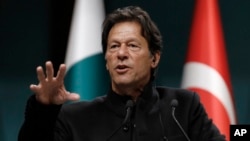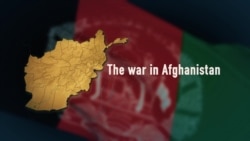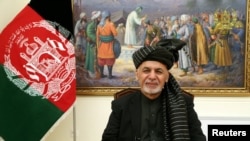In reaction to the latest remarks from the Pakistan prime minister about the formation of an interim government in Afghanistan, the Afghan government has recalled its ambassador and summoned Pakistan deputy ambassador to Afghanistan to lodge a formal protest.
Atif Mashal, the Afghan Ambassador to Pakistan, announced in a tweet Tuesday:
Talking to a group of reporters, Prime Minister Imran Khan, reportedly called for the formation of a “neutral interim government,” in Afghanistan to help the ongoing peace talks with the insurgents.
“The Afghan peace process can only be successful if there is a neutral interim government, which can hold free and transparent elections to be participated by all the stakeholders,” the Express Tribune Pakistani newspaper Tuesday quoted Khan as telling a group of journalists in his office.
Out of context
Pakistan’s foreign office said Wednesday that Khan’s comments have been taken out of context.
“Pakistan has no other interest in Afghanistan but to promote peace through an Afghan owned and Afghan led political process,” Pakistan’s foreign office said in a statement.
The prime minister was only referring to “Pakistan’s model, where elections are held under an interim government. The comments should not be misinterpreted to imply interference in Afghanistan’s internal affairs,” the statement added.
Sebghat Ahmadi, a spokesperson of the Afghan Ministry of Foreign Affairs, however, said Khan’s remarks have not been taken out of context and that they amount to a clear act of interference.
The issue [remarks] has absolutely not been misunderstood. Things have been very clear. Others have also emphasized and called it out,” Ahmadi said, referring to tweets by U.S. Ambassador to Afghanistan John Bass and U.S. Special Representative for Afghan Reconciliation Zalmay Khalilzad.
Tweets
Khalilzad took to Twitter Tuesday and criticized Khan over his latest remarks about Afghanistan.
Bass, the U.S. Ambassador to Afghanistan, also criticized Khan’s comments and urged the Pakistani leader to control his temptation to “ball-tamper” with the Afghan peace process.
“We have no doubt, based on the past experiences, that an interim government would take Afghanistan back to square one. The people of Afghanistan are seriously concerned about this,” Bashir Bezhan, a Kabul-based political analyst said, referring to how an interim government that was supposed to pave the way for elections in the 1990s following the Soviet Union withdrawal from Afghanistan actually led to a bloody civil war in the country.
“If Pakistanis truly want to help Afghanistan, they should help with convincing the Taliban to engage in talks and make peace with the Afghan government since the country has the means to do that,” Ishaq Atmar, another Kabul-based analyst said.
Overreaction?
Other experts charge that U.S and Afghan officials are overreacting to Khan’s comments.
“The U.S. is having a direct dialogue with Taliban without the Afghan government but the Afghan government is not reacting on it as strongly. They are overreacting on Pakistan PM’s statement and this backlash is uncalled for,” Hassan Askari Rizvi, a Pakistan-based analyst, said.
“The probability of many changes are on the table … there is a strong chance the current Afghan government will not remain intact if both the Taliban and U.S reach an agreement. Pakistan’s prime minister have indicated towards this possibility in an indirect approach,” Rizvi added.
“It’s not just about Imran Khan’s statement. Many other circles have hinted towards it before, even U.S. has in the past said that there will be an interim setup in Kabul before the elections. … Afghan government has overreacted on the matter,” said Najam Rafiq, another analyst following the developments.
US-Afghan tensions
Since the beginning of the direct talks between the U.S. and Taliban to end the 17-year conflict in the country, the Afghan government, though supportive of the U.S. efforts in public, has expressed concerns and frustrations in private over being excluded.
WATCH: Afghanistan War: Facts From the 17-Year Conflict
The frustration of Kabul over the U.S. peace talks with the insurgents erupted in public earlier this month when Afghan National Security Adviser Hamdullah Mohib accused Khalilzad, the U.S. special representative, of having an eye on the Afghan presidency.
Mohib’s remarks were met with strong reaction to date from the State Department, which reportedly instructed U.S. officials not deal with him anymore.
On Monday, a U.S. delegation reportedly walked out of a meeting at the Afghan presidential palace, where President Ashraf Ghani was meeting a number of diplomats, when they saw the Afghan national security adviser, according to a Wall Street Journal report.
The Afghan government has not made an official announcement yet, but there are reports that the Afghan president is considering to replace his national security adviser to ease tensions with the U.S.
Spoiler?
With looming elections in a few months, current and former U.S. officials told Reuters that Ghani might position himself to spoil the ongoing negotiations.
“(Ghani’s worried) there could be some agreement for an interim government and he’ll be on the outside looking in,” a U.S. official, speaking on condition of anonymity, told Reuters.
Bill Roggio, editor of “The Long War Journal,” which closely monitors the Afghan conflict, believes that Ghani’s concerns are justified.
“I certainly think Ghani would definitely be seeking to be president of Afghanistan again but I don’t think he is wrong about the government being locked out of the peace talks. ... They have no reason to trust the Taliban that refuses to talk them,” Roggio said.
Reuters, VOA’s Mohammad Habibzada and Madeeha Anwar contributed to this report







